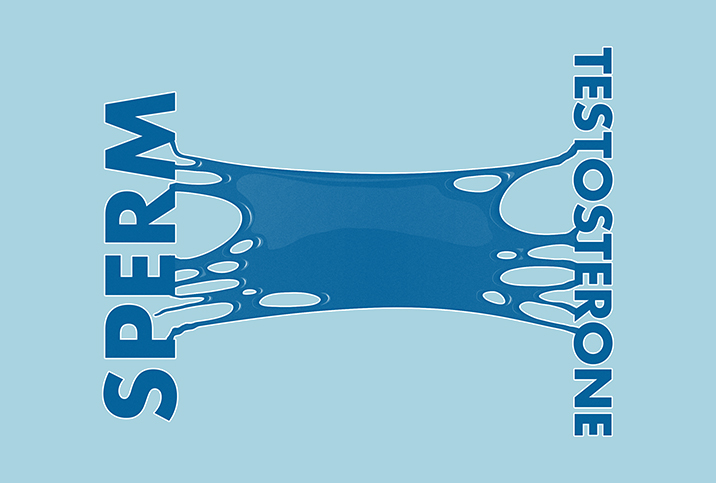Testosterone's Special Relationship With Sperm and Fertility

You likely know about the super-powered punch behind testosterone, the sex hormone needed for muscle and hair growth and the development of the reproductive organs. The hormone also contributes to a man's sexual function and is required for sperm production. Low levels of testosterone (also known as low-T) might be responsible for infertility, or the inability to conceive children. Unfortunately, infertility is all too common in the United States, with about 9 percent of men of reproductive age experiencing fertility issues, and male infertility on the rise possibly as a result of environmental factors.
Sperm production, however, is stimulated by hormones other than just testosterone. The level of testosterone in the testicles—where sperm is produced—is often higher than in the blood. Men can have their testosterone levels checked with blood tests. Those diagnosed with low testosterone may have sufficient levels of the hormone for sperm production.
Behind low testosterone
As men age, their testosterone level gradually decreases, with nearly 40 percent of men ages 45 and older experiencing low levels of testosterone. Symptoms of low-T, also known as hypogonadism, include loss of muscle mass, reduced body and facial hair, low sex drive, erectile dysfunction (ED), reduced sperm count and infertility. Some men with low T have symptoms that will improve with testosterone replacement therapy.
What does testosterone replacement therapy do?
The brain makes gonadotropin-releasing hormones (GnRH) that signal the testicles to produce more testosterone, which is essential for a healthy sperm count.
During replacement therapy, testosterone is added into your bloodstream through patches, gels, injections, oral tablets or other methods. As testosterone blood levels increase, symptoms of low-T ease. Studies show that this therapy also improves libido, sexual and physical function, mood and erections while reducing depression and abdominal fat.
However, your brain interprets this rise in testosterone levels as a sign that you now have enough testosterone, and it then stops sending signals to the testicles to produce more. When your testicles do not produce more testosterone, your sperm production declines.
How does testosterone therapy impact fertility?
As counterintuitive as this may sound, by taking extra testosterone, you can shut off your body's ability to make testosterone and sperm. The resulting low sperm count—meaning your semen contains fewer sperm than is typical—makes it more difficult to conceive a child. One of the most common factors behind infertility is low sperm count.
Testosterone therapy lowers the production of the follicle-stimulating hormone (FSH), which is the hormone that drives sperm production. When FSH levels decrease, so does sperm production. Testosterone therapy may also lead to the shrinking of the testes, which can result in infertility.
While testosterone supplements might help with sexual desire, they can lower fertility. In general, stopping the therapy will cause sperm production to return to normal, though regaining fertility could take months. In some cases of long-term use of injectable testosterone, men may experience a permanent loss in sperm production.
If you want to take testosterone supplements to increase your libido or energy, talk to your doctor about your options. Guys looking to father children should consider freezing their sperm (also known as sperm banking) so they can fertilize a partner's or a donor's egg when they're ready to start a family. Another option would be to forgo testosterone supplements until you are certain you do not want to have children.
Treatment for low-T and infertility
Before trying testosterone replacement therapy to combat their fertility issues, men should first attempt lifestyle changes. Modifications that help improve testosterone levels include quitting smoking, losing weight, exercising, eating a nutritious diet and consistently clocking at least seven hours of sleep a night. Cutting back on drinking can also help, as alcohol consumption reduces testosterone levels and can lead to reduced sperm production. Certain medications, such as clomiphene citrate and letrozole, can help you raise testosterone levels, as well.
Everyone needs testosterone, though the "right" amount of the hormone isn't so clear. Your doctor can check your testosterone levels with a simple blood test, but as your hormone levels fluctuate throughout the day, you might need several tests. More research is needed to fully understand testosterone and how to interpret the test results.
As infertility is quite common, remember that you are not alone. Focus on improving your overall health. Although there is no certain fix, if low testosterone levels or a poor diet are contributing to your infertility, lifestyle modifications are a good start as you and your doctor chart a course toward improved reproductive health.
And if you don't have a regular physician, now is the time to find one. Giddy telehealth takes the difficulty out of such a search, providing access to hundreds of healthcare professionals who offer video visits as a regular part of their practices. It is an easy-to-use online portal whose physicians, therapists and others have expertise across the full scope of medical care. Many have same-day appointments.


















